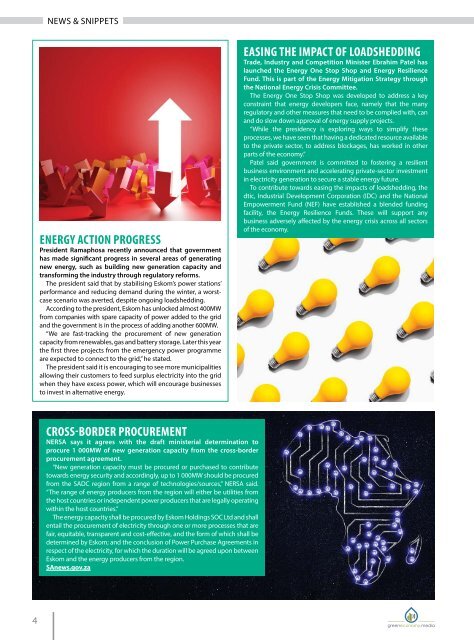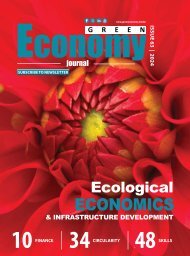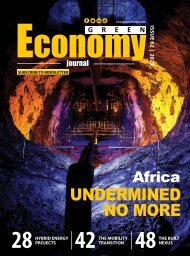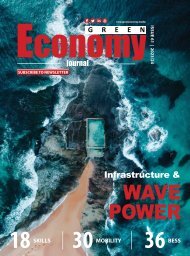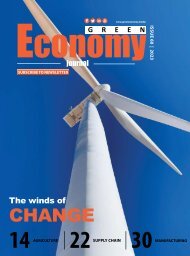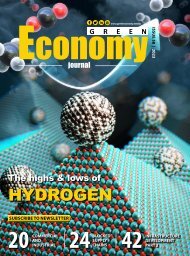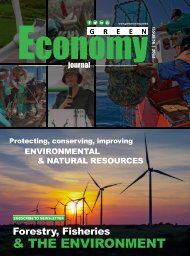Create successful ePaper yourself
Turn your PDF publications into a flip-book with our unique Google optimized e-Paper software.
NEWS & SNIPPETS<br />
ENERGY ACTION PROGRESS<br />
President Ramaphosa recently announced that government<br />
has made significant progress in several areas of generating<br />
new energy, such as building new generation capacity and<br />
transforming the industry through regulatory reforms.<br />
The president said that by stabilising Eskom’s power stations’<br />
performance and reducing demand during the winter, a worstcase<br />
scenario was averted, despite ongoing loadshedding.<br />
According to the president, Eskom has unlocked almost 400MW<br />
from companies with spare capacity of power added to the grid<br />
and the government is in the process of adding another 600MW.<br />
“We are fast-tracking the procurement of new generation<br />
capacity from renewables, gas and battery storage. Later this year<br />
the first three projects from the emergency power programme<br />
are expected to connect to the grid,” he stated.<br />
The president said it is encouraging to see more municipalities<br />
allowing their customers to feed surplus electricity into the grid<br />
when they have excess power, which will encourage businesses<br />
to invest in alternative energy.<br />
CROSS-BORDER PROCUREMENT<br />
NERSA says it agrees with the draft ministerial determination to<br />
procure 1 000MW of new generation capacity from the cross-border<br />
procurement agreement.<br />
“New generation capacity must be procured or purchased to contribute<br />
towards energy security and accordingly, up to 1 000MW should be procured<br />
from the SADC region from a range of technologies/sources,” NERSA said.<br />
“The range of energy producers from the region will either be utilities from<br />
the host countries or independent power producers that are legally operating<br />
within the host countries.”<br />
The energy capacity shall be procured by Eskom Holdings SOC Ltd and shall<br />
entail the procurement of electricity through one or more processes that are<br />
fair, equitable, transparent and cost-effective, and the form of which shall be<br />
determined by Eskom; and the conclusion of Power Purchase Agreements in<br />
respect of the electricity, for which the duration will be agreed upon between<br />
Eskom and the energy producers from the region.<br />
SAnews.gov.za<br />
EASING THE IMPACT OF LOADSHEDDING<br />
Trade, Industry and Competition Minister Ebrahim Patel has<br />
launched the Energy One Stop Shop and Energy Resilience<br />
Fund. This is part of the Energy Mitigation Strategy through<br />
the National Energy Crisis Committee.<br />
The Energy One Stop Shop was developed to address a key<br />
constraint that energy developers face, namely that the many<br />
regulatory and other measures that need to be complied with, can<br />
and do slow down approval of energy supply projects.<br />
“While the presidency is exploring ways to simplify these<br />
processes, we have seen that having a dedicated resource available<br />
to the private sector, to address blockages, has worked in other<br />
parts of the economy.”<br />
Patel said government is committed to fostering a resilient<br />
business environment and accelerating private-sector investment<br />
in electricity generation to secure a stable energy future.<br />
To contribute towards easing the impacts of loadshedding, the<br />
dtic, Industrial Development Corporation (IDC) and the National<br />
Empowerment Fund (NEF) have established a blended funding<br />
facility, the Energy Resilience Funds. These will support any<br />
business adversely affected by the energy crisis across all sectors<br />
of the economy.<br />
SA’s DEDICATED GREEN HYDROGEN FUND<br />
A Heads of Agreement has been concluded with<br />
the intention to launch a “SA-H2 Fund” (SA-H2).<br />
SA-H2 is an innovative blended finance fund,<br />
that will facilitate the development of a green<br />
hydrogen sector and circular economy in South<br />
Africa. The Fund is supported by Climate Fund<br />
Managers and Invest International B.V. (II) of the<br />
Netherlands, Sanlam Limited, the Development Bank<br />
of Southern Africa and the Industrial Development Corporation of<br />
South Africa (IDC), in collaboration with other strategic partners.<br />
The SA-H2 Fund initiative will aim to secure US$1-billion in funding,<br />
to be raised directly in South Africa or indirectly via other channels.<br />
Its focus will be to fast-track the mobilisation of funding towards<br />
the development and construction of large-scale green hydrogen<br />
infrastructure assets across South Africa.<br />
How SA-H2 will work<br />
“Succeeding in a just transition to cleaner energy rests on our ability<br />
to create a viable marketplace that attracts and mobilises public and<br />
private capital, and this fund will do just that. We will create and use<br />
innovative blended finance architecture and structuring to build a<br />
substantial pipeline of green hydrogen projects in South Africa. This<br />
will give private sector developers access to risk capital from an early<br />
stage of development, throughout construction and into operations,”<br />
says Catherine Koffman, group executive: project preparation, DBSA.<br />
UNLOCKING SA’s PROSPERITY<br />
The African Continental Free Trade Area (AfCFTA) holds the power<br />
to unleash an economic revolution – ushering in unparalleled<br />
progress and prosperity like never before. For South Africa<br />
and for most of the continent, a key aspect for reaping the full<br />
benefits of AfCFTA and securing a brighter future lies in moving<br />
quickly to ensure a stable energy supply.<br />
AfCFTA, phase 1, is seeing incremental implementation despite<br />
some key unresolved negotiations on rules of origin and tariff<br />
schedules, has the potential to become an unparalleled titan of<br />
free trade agreements. It seeks to gradually eliminate tariffs on<br />
90% of goods and reduce trade barriers. The UN Conference of<br />
Trade and Development estimates that the agreement could<br />
boost intra-African trade by about 33% and cut the continent’s<br />
trade deficit by 51%.<br />
To truly unlock the benefits of AfCFTA, the whole continent<br />
must make a comprehensive energy strategy top priority. Solving<br />
the energy crisis cannot be achieved in isolation; it requires<br />
collaboration between governments, private sector entities and<br />
international partners.<br />
It is heartening to note that the Presidential Climate Commission<br />
has unequivocally underscored the urgency of securing a sustainable<br />
NEWS & SNIPPETS<br />
“Further, this fund is a significant addition to national efforts to<br />
leverage our existing renewable energy infrastructure. With a national<br />
target of US$250-billion investment in green hydrogen by 2050,<br />
this sector is projected to amplify the development impact of the<br />
renewable energy industry.”<br />
Key role for the Fund<br />
Joost Oorthuizen, CEO of Invest International: “SA-H2 is a showcase<br />
of how public, private, international and local parties can join forces<br />
to create a catalytic effect on the development of an exciting new<br />
sector. <strong>Green</strong> hydrogen projects in South Africa can contribute to<br />
local sustainable development and support the energy transition<br />
locally as well as in export markets. While deploying its funds, Invest<br />
International makes efforts to demonstrate strong environmental and<br />
social commitment, strive for local impact and inclusive growth, and<br />
combine the expertise of Dutch and South African businesses.”<br />
Re-industrialisation in South Africa<br />
Joanne Bate, COO, IDC says: “The development of this new industry<br />
will support the longer-term energy security priority and the just<br />
energy transition contribution will proactively address socioeconomic<br />
development. South Africa will position itself as a<br />
globally competitive player in this industry. More importantly, green<br />
hydrogen will enable the local decarbonisation of hard-to-abate<br />
industrial sectors.”<br />
energy supply. It has stated that energy planning should consider<br />
climate change mitigation due to the magnitude of climate risk.<br />
The commission also emphasised that electricity planning should<br />
be based on least-cost pathways. All reviewed models demonstrated<br />
that the least cost energy model would involve investments in variable<br />
renewable energy (wind and solar), storage (batteries and pumped<br />
hydro) and peaking support.<br />
Government must urgently expand renewable energy production<br />
and upgrade the grid infrastructure. To attract private investment,<br />
policy frameworks must be streamlined.<br />
We must prioritise developing the capacity of the energy<br />
sector. By nurturing a skilled workforce, we can accelerate project<br />
implementation. Effective partnerships with educational institutions<br />
and industry stakeholders are crucial to address the skills gap.<br />
The effective implementation of AfCFTA will streamline trade<br />
regulations, customs procedures and remove barriers. Through<br />
regional cooperation and market integration, it can enable economies<br />
of scale, attracting investors to tap into Africa’s expanding energy<br />
demand. This could fuel more energy sector investments, establishing<br />
Africa as an energy secure region and an industrial powerhouse.<br />
By Wrenelle Stander, CEO of Wesgro<br />
GRID CAPACITY ALLOCATION RULES<br />
SAWEA has noted the court’s ruling to dismiss the urgent interdict in relation to the interim grid capacity allocation rules (IGCAR).<br />
The ruling will enable the industry to deliver much needed new generation capacity, as the state utility is able to grant the required<br />
budget quotes in line with the IGCAR.<br />
The process to allocate grid access impacts projects differently, however, as it currently stand the IGCAR will allow the urgent deployment<br />
of new generation. As such, and in line with the ruling, SAWEA has reaffirmed its commitment to working with all key stakeholders to<br />
accelerate the connection of shovel-ready projects with a view to alleviating the energy crisis.<br />
SAWEA encourages progressive industry discussions with the System Operator regarding the optimisation of the grid including<br />
the allocation of grid capacity, in line with the industry’s objective to develop a favourable regulatory environment for the rollout<br />
of renewable energy. As an association advocating for the advancement of the wind energy sector, SAWEA continues constructive<br />
engagement with all key stakeholders, including the presidency, NECOM, and Eskom to find solutions that support the construction or<br />
expansion of utility scale wind projects to help solve the country’s energy crisis.<br />
4 5


